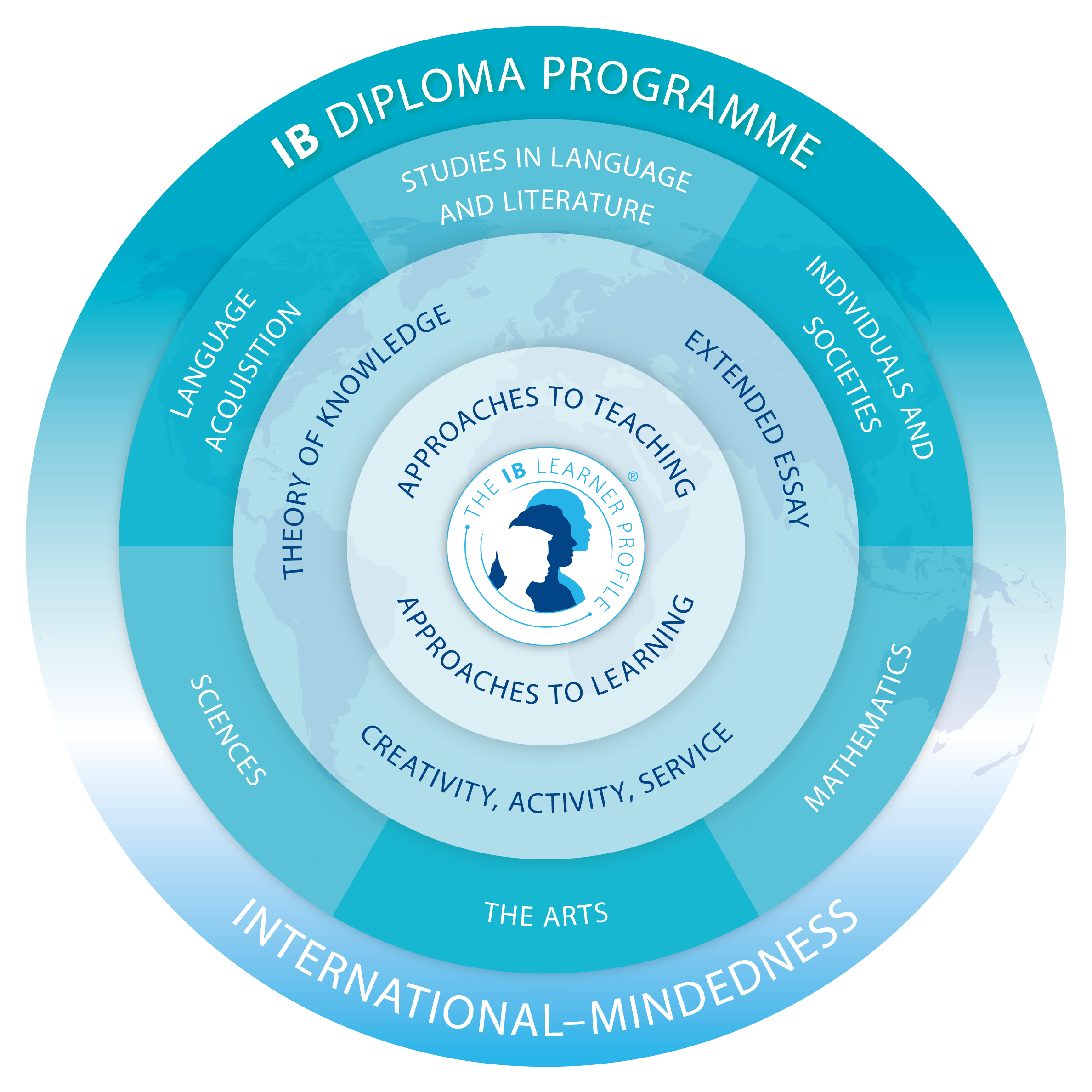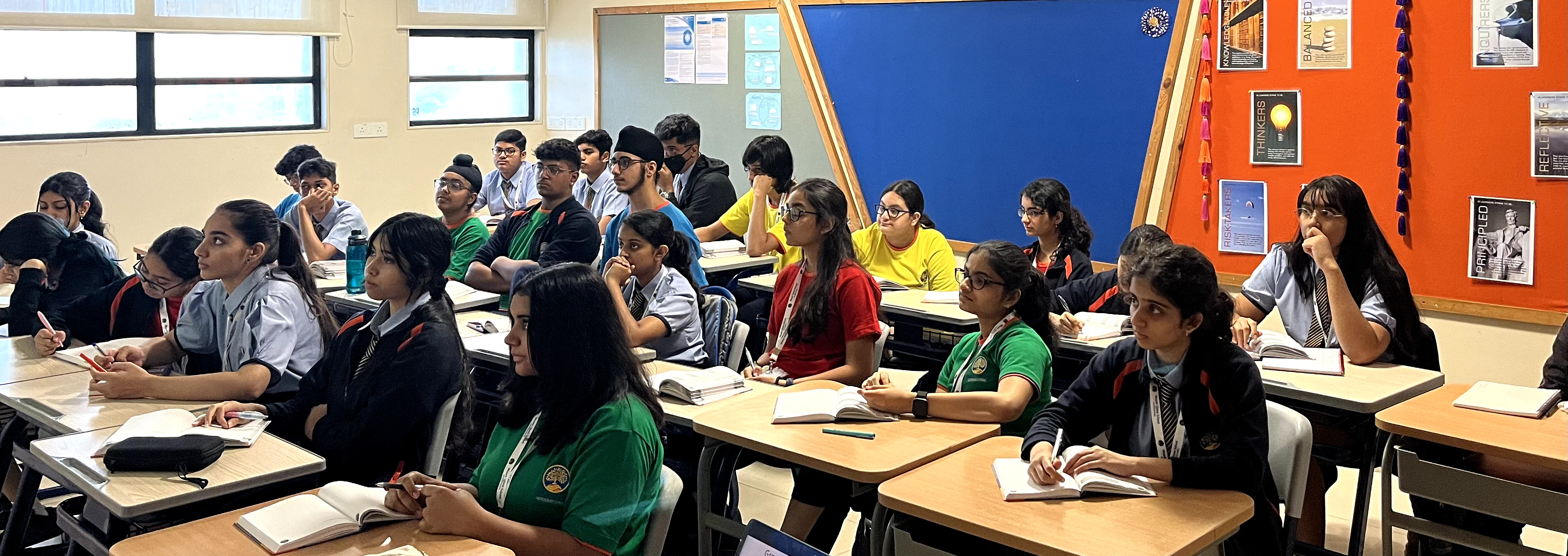IB Diploma Programme (DP)
The IB Diploma Programme (DP) a curriculum framework designed by the International Baccalaureate (IB) for students in the last two years of high school.
It is a two year course that is academically challenging and balanced covering basic disciplines such as languages, arts, science, maths as well as providing opportunity for increased emphasis in selected subjects. It addresses the intellectual, social, emotional and physical well-being of students, and is respected by leading universities across the globe.It continues to be one of the most prestigious pre- university qualifications across the globe.IB students graduating with the IB diploma are able to study at universities all around the world, often with advanced credit.
Examinations are held at the end of Year 2, i.e. Grade 12.
The Diploma Programme is designed as a 'holistic programme that addresses the intellectual, emotional and physical well-being of students in Grades 11 & 12' and is receptive to the demands of a globally interconnected world which demands problem solving and analytical skills.
The DP is committed to the development of students according to the attributes shown in the IB learner profile. The IB learner profile describes the shared values that inform an IB education. The learner profile is a great summary of what the IB programmes want to achieve in terms of moulding the students into future leaders of the world.
Through the DP, schools are able to develop students who:
- have excellent breadth and depth of knowledge
- flourish physically, intellectually, emotionally and ethically
- study at least two languages
- excel in traditional academic subjects
- explore the nature of knowledge through the programme's unique theory of knowledge course.
Most successful Diploma Programme students lead very full lives. They are often members of athletic teams and involved in a wide range of activities. Time management and organization are key skills the IB develops in students.
International research shows that there are many benefits to choosing the DP over other 16-19 curricula. For example:
- DP students are better able than their peers to cope with demanding workloads, manage their time and meet the expectations placed on them, according to one study
- Analysis of DP students in Canada, the UK and the USA found that the DP's extended essay improves students' approach to learning in higher education
- 72% of students taking the DP in China attend one of the world's top 500 universities, according to a 2013 study.
Some key features of Diploma Programme assessment include the following.
- An emphasis on criterion-related (as opposed to norm-referenced) assessment
- This method of assessment judges students' work in relation to identified levels of attainment, rather than in relation to the work of other students.
- Valuing the most accurate demonstration of student performance, rather than just averaging attainment grades over a reporting period. IB Assessments deliver valid, fair and reliable results for students across the world.
The IBDP curriculum contains six subject groups together with a core made up of three separate parts as illustrated in the curriculum model below:

Students are expected to study three subjects at 'Higher Level' (HL) and three at 'Standard Level' (SL).
In addition to this, the three mandatory core components that contribute to a student's educational experience and challenge them to apply their knowledge and understanding are:
- The extended essay: The extended essay is a serious piece of academic research and writing wherein students independently research and investigate a topic of interest to produce a 4000-word in- depth study.
- Theory of knowledge (TOK) offers an opportunity for students to reflect on the nature of knowledge by critically examining how we know, through different ways of knowing and areas of knowledge. Students develop awareness of their own perspectives can act responsibly in an increasingly interrelated world.
- Creativity, activity, service (CAS) involves students in an array of different activities (such as community service work, sports, creative pursuits) alongside their academic studies thus fostering an appreciation of life beyond the classroom walls.
Through the Diploma Programme (DP) core, students reflect on the nature of knowledge, complete independent research and undertake a project that often involves community service.The Core ensures that the approach to learning is interdisciplinary, which allows our students to build skills that can help them engage with complex ideas and appreciate multiple perspectives.
Students need to select 6 subjects across the subject groups. (Or one subject from each of the 5 groups and the sixth subject can be from Group 3 or 4). Three subjects need to be at Higher Level (HL) and three subjects at Standard Level (SL).
Within each subject group, the courses offered at MLSI include:
| Group 1 | Group 2 | Group 3 | Group 4 | Group 5 | Group 6 |
|---|---|---|---|---|---|
|
English A
HL SL |
French Ab Initio SL |
Business Management HL SL |
Physics
HL SL |
Mathematics Application & Interpretations HL SL |
Visual Art
HL SL |
|
French B SL
SL |
Economics
HL SL |
Chemistry
HL SL |
|||
|
Hindi B
HL SL |
Psychology HL SL |
Biology
HL SL
Computer Science
HL SL |
|||
|
Spanish Ab Initio
SL |
Environmental Systems & Societies HL SL |
Design Technology
(Will be offered depending on number of takers) HL SL
Sports Exercise
and Health Science (SEHS) HL SL |
Mathematics Analysis & approaches HL SL |
||
|
Spanish B
SL |
History
HL SL |
Environmental Systems & Societies
HL SL |
* These subjects will be offered depending on student interest and size of the cohort.
* To learn more about DP subjects, explore detailed information on each subject by clicking on the respective links.
- Experienced, internationally qualified and IB trained staff. Among our staff we have Examiners, Workshop Leaders, School Visit Leaders and a motivated faculty who have an international outlook, with strong Indian values. All our DP teachers are highly trained professionals and subject experts in their fields and are also trained in the IB's approaches to teaching and approaches to learning
- Our infrastructure includes world class laboratories (physics, chemistry, biology, design technology, Apple Supported iMac lounge) and other facilities in order to enhance student learning at the high school level.
- A well resourced library and media centre to keep up with current developments in IB education.
- Ergonomic classrooms with state-of-the-art infrastructure
- 45,000 Sq. ft. indoor sports complex
- Nurturing, caring and safe environment
- Conveniently located in BKC
- Being international-minded, global citizens who are inter-culturally aware, are the key traits that benefit the IB Diploma graduates in their university studies and career pursuits. Our full time College Counsellor guides and supports students in their university choices, based on their aptitude and aspirations.
- Our assessments use a variety of tasks, including examination papers, written assignments like essays, oral interviews, scientific and mathematical investigations, fieldwork projects and artistic works, which are completed by candidates at various times during their course.
- Our CAS programme, Theory of Knowledge (TOK) lessons and the Extended Essay process allows our students to showcase not only their knowledge but their gamut of 21st century skills they have developed as lifelong learners.
- Community service is an important component of our DP programme ensuring that the students reflect on their contextual learning and are motivated for self-initiated action for their community.
- MLSI's IB Diploma Programme (Grade 11) is offering 100% scholarship* on tuition fees to exemplary students for the academic year 2024-25.
For more details about the IBDP programme, visit www.ibo.org

